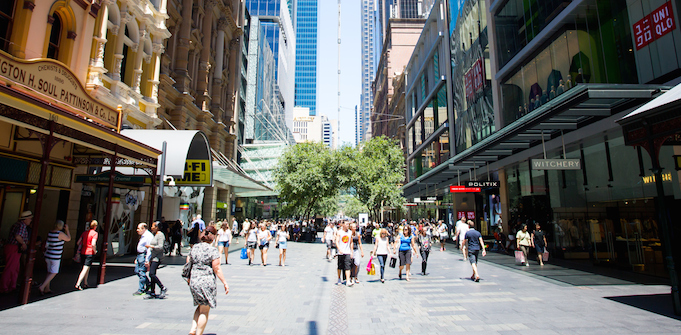
Retail experts predict more blood will be spilled in the face of challenging conditions in 2018, with traditional retailers forced to confront new breeds of shoppers if they have any shot at success.
Research house Euromonitor International has released its global consumer trends report for 2018, arguing there are 10 emerging types of consumer whose needs reflect a fragmented, flexible and individualised society.
One of the key challenges for retailers is shrinking their offers to fit with shoppers who simply want less of what is being sold, Euromonitor analysts say.
“Consumers of all ages want and need less. Ownership is under question, and flexible, minimalist living is gaining popularity, with consumers sharing everything from clothing, household items and pets through to cars and living spaces,” the 2018 report overview highlights.
With this in mind, here are three new types of customer set to redefine retail over the next 12 months.
The rise of the “adaptive entrepreneur”
It’s not just a preference for minimalism that’s affecting retail across the globe: Euromonitor highlights that the rise of gig-economy workers, entrepreneurs and the self-employed are demanding new types of retail experiences. Drawing on a range of research across 2017, analysts estimate 50% of workers across all generations aspire to be self-employed.
Six out of 10 millennials expect to be self-employed throughout their careers, according to the research house’s 2017 reports into consumer trends. This suggests a big cohort of flexible workers with new preferences for how retailers interact with them, says the report.
The growing base of workers operating on their own timetables, rather than the nine-to-five, means this cohort of “adaptive entrepreneurs” are more interested in products and services that fit seamlessly with their schedules.
“They want a lifestyle they can build themselves, and align with their personal interests and passions,” the report says.
When Amazon launched in Australia at the end of 2017, experts reflected on the importance fast, “last mile” delivery and personalised algorithms will have on retail in the future. Retail experts warned businesses to beef up their fast delivery options, while working on ways to predict what a customer wants as they move through a store or website.
“Personalise, and think about using machine learning to predict what customers will base their purchasing on. Add reviews and recommendations, or use algorithms to recommend things to them,” retail consultant John Batistich told SmartCompany in December.
The “view in my room” cohort
Consumers still care about the lowest price — and now they have more ways than ever to shop around without even leaving their bedrooms.
Euromonitor analysts report that across all markets, more customers are using smartphones for retail purchases than ever before.
However, with this take-up comes an increase in potentially missed opportunities for retailers, as customers spend more time surveying all options before finally deciding on the best and easiest purchase option, often without leaving the house.
According to SalesCycle’s 2017 data, in the third quarter of the year “global sales cart abandonment” increased by 1.5% to 74.98%. This suggests customers have thought about buying something online, but have “struggled to see whether it’s what they really want”, say Euromonitor analysts.
Retailers must bring their artificial intelligence (AI) and virtual reality strategies up to scratch in 2018, according the analysts.
Good AI tools can help retailers convert the online browsing customers do into actual purchases, sealing the deal before the millions of other competitors can steal an online shopper away from you.
“Consumers will look for [augmented reality] apps that test cosmetics in a selfie-style format, try on clothes in digital dressing rooms and choose glasses frames from the comfort of their sofa,” Euromonitor suggests.
“Sleuthy shoppers” consider ethics
Ethical shopping has transitioned from a niche trend into a default approach for younger consumers, with more and more shoppers predicted to be sceptical of “mass produced products” in 2018, say the analysts.
Euromonitor’s Global Consumer Trends report for 2017 saw 53% of Generation X shoppers and 52% of Generation Y shoppers report they would only shop with a brand they trusted, compared with just under half of baby boomers.
Retailers must understand that for this growing cohort of consumer, research into purchases starts “far ahead of the transaction process”.
This includes researching supply chains and production processes in detail, a practice which Euromonitor analysts say is becoming more automatic for shoppers.
In Australia, social media campaigns around ethical production are gaining momentum, with projects like #WhatSheMakes seeing hundreds of shoppers lobbying discount department stores and mid tier retailers to commit to minimum standards of payment across their supply chains.
In 2018, retailers must remember shoppers are looking past “faux artisinal products”. Instead, they will be looking to crack the secrets of a retailer’s supply chain, making a purchase decision only after they are happy with the result.
These consumers are not only interested in the product, the report highlights.
“They are buying its entire history and everything that it represents.”
Never miss a story: sign up to SmartCompany’s free daily newsletter and find our best stories on Twitter, Facebook, LinkedIn and Instagram.


COMMENTS
SmartCompany is committed to hosting lively discussions. Help us keep the conversation useful, interesting and welcoming. We aim to publish comments quickly in the interest of promoting robust conversation, but we’re a small team and we deploy filters to protect against legal risk. Occasionally your comment may be held up while it is being reviewed, but we’re working as fast as we can to keep the conversation rolling.
The SmartCompany comment section is members-only content. Please subscribe to leave a comment.
The SmartCompany comment section is members-only content. Please login to leave a comment.